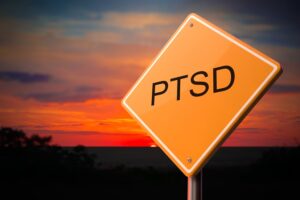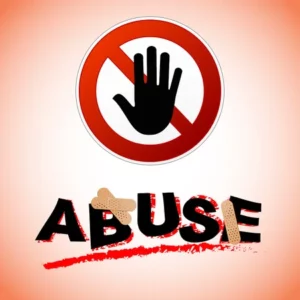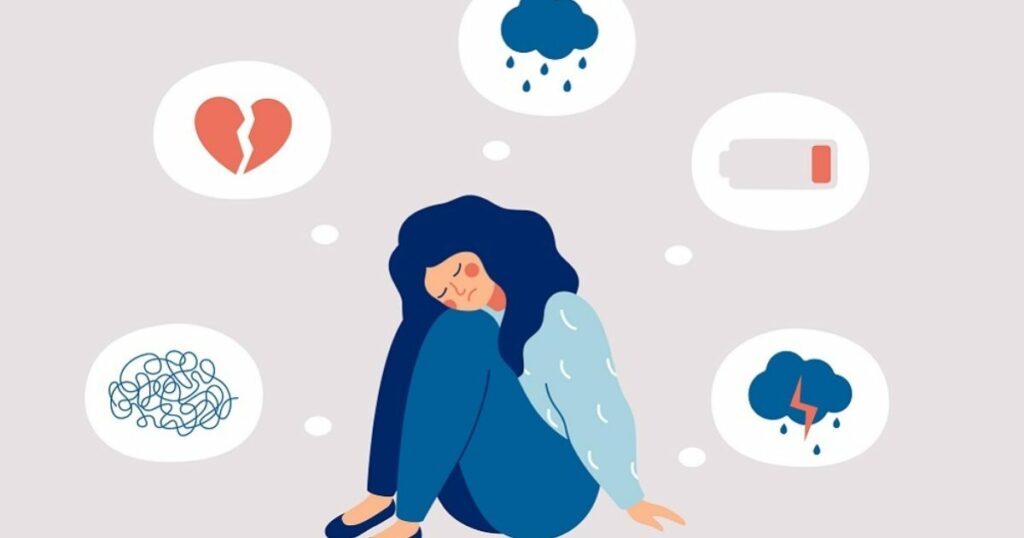Post-traumatic stress disorder (PTSD) is a mental health condition that can occur after you experience or witness a traumatic event. Many people know about the most common causes of PTSD, such as military combat or sexual assault. However, there are many other causes of PTSD that are less well-known. In this blog post, we will discuss 12 of the most common causes of PTSD. If you think you may be suffering from PTSD, it is important to seek help from a qualified professional.
Contents
Defining PTSD
 Before understanding the causes of PTSD, it is important to understand what the condition actually is. PTSD is a type of anxiety disorder that can develop after exposure to a traumatic event. The event can be something that threatened your life or the life of someone close to you. It can also be something that you witnessed, such as a natural disaster or an act of violence.
Before understanding the causes of PTSD, it is important to understand what the condition actually is. PTSD is a type of anxiety disorder that can develop after exposure to a traumatic event. The event can be something that threatened your life or the life of someone close to you. It can also be something that you witnessed, such as a natural disaster or an act of violence.
Many people who experience a traumatic event will have symptoms of PTSD in the days and weeks following the event. For most people, these symptoms will go away on their own. However, for some people, the symptoms will persist and may even get worse over time. If you have symptoms of PTSD that last for more than a month, you may have PTSD. There are four main types of symptoms associated with PTSD:
- Intrusive thoughts: This can include unwanted memories of the event, flashbacks, and nightmares.
- Avoidance: This can include avoiding people, places, or things that remind you of the event.
- Changes in mood and thinking: This can include feeling detached from others, negative beliefs about yourself or the world, and memory problems.
- Changes in physical and emotional reactions: This can include feeling on edge, being easily startled, and having trouble sleeping.
If you have any of these symptoms, it is important to seek help from a mental health professional. They will be able to diagnose you and provide you with the treatment you need.
12 Causes Of PTSD
Now that we have a more solid understanding of what PTSD is, let’s take a look at the different causes.
Abuse
 Abuse is defined as any kind of physical, sexual, emotional, or mental maltreatment. Unfortunately, abuse is quite common, and is perhaps the most obvious cause of PTSD. Anyone can be a subject of abuse, though it is most commonly seen in children and women. Some of the instances which fall under the category of abuse of any kind includes:
Abuse is defined as any kind of physical, sexual, emotional, or mental maltreatment. Unfortunately, abuse is quite common, and is perhaps the most obvious cause of PTSD. Anyone can be a subject of abuse, though it is most commonly seen in children and women. Some of the instances which fall under the category of abuse of any kind includes:
- Physical abuse: Beatings from parents, teachers, spouses, and intimate partners.
- Sexual abuse: Rape, molestation, incest.
- Emotional abuse: Verbal attacks, threats, or constant criticism.
- Mental abuse: Constant put-downs, manipulation, or gaslighting.
All of these instances can leave lasting psychological scars and can cause PTSD.
Childhood trauma
It is rightly said that childhood is the most impressionable time in a person’s life. Unfortunately, many children go through traumatic experiences that can have a lasting effect on their mental health. Some of the most common causes of childhood trauma are:
- Abuse of any kind
- Neglect
- Comparisons
- Invalidation or rejection
- Constant relocation or change in guardians
- Identity crisis
- Loss of a parent or loved one
- Disturbances in the family
- Violence
All of these experiences can be quite traumatizing for a child. As one constantly grows and matures, these traumas can resurface in the form of PTSD.
War
 This is one of the most well-known causes of PTSD. It is estimated that up to 20% of veterans who served in combat will develop PTSD. The experience of combat can be very traumatic and can lead to long-term mental health problems. Because the warzone is a witness to some of the most horrific things imaginable, it is not surprising that many people who serve come back with PTSD. It is also to note that war not only affects the soldiers who are fighting, but also other officials who are present at the warzone, such as journalists and medical personnel. Some of the instances that can cause PTSD during war are:
This is one of the most well-known causes of PTSD. It is estimated that up to 20% of veterans who served in combat will develop PTSD. The experience of combat can be very traumatic and can lead to long-term mental health problems. Because the warzone is a witness to some of the most horrific things imaginable, it is not surprising that many people who serve come back with PTSD. It is also to note that war not only affects the soldiers who are fighting, but also other officials who are present at the warzone, such as journalists and medical personnel. Some of the instances that can cause PTSD during war are:
- Experiencing or witnessing death
- Injury
- Kidnapping
- Having to kill another person
- Living in a constant state of fear
- Poor living conditions
- Being imprisoned
- Torture
- Losing colleagues
- Sexual assault
All of these can lead to the development of PTSD because of the trauma they cause.
Professional stress/trauma
There are a lot of professions that require one to deal with traumatic events on a regular basis. Some examples of such professions are:
- Police officers
- Firefighters
- Hotline operators
- Paramedics
- Doctors and nurses
- Lawyers
- Journalists
- Psychologists
All of these people are constantly exposed to constant stress and trauma. Because they are constantly dealing with such events, they have a higher risk of developing PTSD.
Health crisis
It is no secret that psychological, as well as physiological health, are interconnected. When one’s physical health is in danger, it can lead to a lot of psychological stress and trauma. Some examples of health crises that can cause PTSD are:
- Cancer
- Heart disease
- HIV/AIDS
- Chronic pain
- Stroke
All of these health issues can be quite traumatizing and can lead to the development of PTSD. Since all these conditions have their own unique set of symptoms and treatment, it is important to get the help of a professional if you are suffering from any of them.
Moreover, the treatment that one might have to undergo to treat these conditions can also stem some trauma. For example, cancer patients who have to undergo chemotherapy often suffer from PTSD due to the intense treatment.
Terrorism
Terrorism is the use of violence and fear to achieve a political or ideological goal. It is a global phenomenon, and the victims of terrorism can come from any country. Because of the rather scary, unpredictable, and violent nature of terrorism, it is not surprising that it can lead to the development of PTSD. Some examples of terrorist attacks that can cause PTSD are:
- September 11th Attacks
- Boston Marathon Bombing
- 26/11 Taj Hotel Attacks
- Orlando Nightclub Shooting
- Paris Attacks
All of these attacks were quite traumatizing and led to a lot of people suffering from PTSD. There is a large portion of the population. For example, the commoners, safety personnel, and the family members of the victims, who suffer from PTSD due to these attacks.
Accidents
Accidents are something one can never predict or anticipate. They can happen to anyone, at any time, and can have lasting effects. Some examples of accidents that can cause PTSD are:
- Car accidents
- Bike accidents
- Falls
- Natural disasters
While it may seem minor or something one can easily “get over”, some accidents can be serious enough to cause a great deal of distress and hamper one’s life. For example, if someone was in a near-to-death car accident, they may be likely to have PTSD symptoms such as flashbacks, anxiety, and avoidance. This can cause problems in their life as they may not want to drive or even leave their house.
Pregnancy and childbirth
 Pregnancy is regarded as one of the most beautiful and joyous experiences a woman can have. However, it is also a time when one is constantly under stress and anxiety. The fear of miscarrying, not being able to take care of the child, or even the pain of childbirth can lead to PTSD. Some studies have shown that about 11% of women who have given birth suffer from PTSD. Some of the instances that may happen during this period may involve:
Pregnancy is regarded as one of the most beautiful and joyous experiences a woman can have. However, it is also a time when one is constantly under stress and anxiety. The fear of miscarrying, not being able to take care of the child, or even the pain of childbirth can lead to PTSD. Some studies have shown that about 11% of women who have given birth suffer from PTSD. Some of the instances that may happen during this period may involve:
- Stress and anxiety about the pregnancy
- Complications during pregnancy
- Premature birth
- Birth defects
- Unsupportive partner/family
- Lack of adequate nutrition
- Miscarriage
- Stillbirth
- Lack of control during labor
- Unwanted Cesarean section
- Postpartum hemorrhage
All of these can be quite traumatizing for the mothers. Additionally, it may also cause danger for the fathers. This may seem unusual, but studies have shown that about 12% of fathers also suffer from PTSD due to the stress of pregnancy and childbirth.
Natural calamities
Natural disasters can be very traumatizing, especially if you lose everything in the event. No one is safe from the wrath of nature. Natural disasters can strike at any time, and often leave a trail of destruction in their wake. Tornadoes, hurricanes, earthquakes, floods, and landslides are just a few examples of natural disasters that can make people suffer from PTSD. Some severe consequences of natural disasters are:
- Homelessness
- Separation
- Loss of property
- Starvation
- Injury
- Death
Natural disasters can have a lasting impact on people, and often leave them feeling scared, anxious, and traumatized.
Severe injuries
It is no secret that our bodies and minds are not designed to handle severe injuries. When we experience a severe injury, it can often lead to lasting effects, both physically and mentally. Some examples of severe injuries that can cause PTSD are:
- Burns
- Amputations
- Spinal cord injuries
- Brain injuries
All of these can be very painful and often leave physical and emotional scarring. They can be life-changing, and often lead to a great deal of anxiety and depression. In severe cases, they can leave people paralyzed, which can be very difficult to cope with. Additionally, they may cause a variety of problems, such as memory loss, cognitive impairment, and personality changes. All of these severe injuries can lead to PTSD.
Betrayal
 It is no secret that humans are social animals. We are constantly interacting with people, and often form close relationships with them. So, when someone we trust betrays us, it can be quite traumatizing. Some examples of such betrayals are:
It is no secret that humans are social animals. We are constantly interacting with people, and often form close relationships with them. So, when someone we trust betrays us, it can be quite traumatizing. Some examples of such betrayals are:
- Infidelity
- Lying
- Robbery
- Theft
- Scam
Witnessing death
Lastly, death is something that is inevitable, and often leaves us feeling scared, alone, and helpless. Losing someone we love can be one of the most traumatizing experiences we can have. Some common reactions to death are:
- Anguish
- Despair
- Guilt
- Grief
- Helplessness
- Loneliness
- Shock
All of these reactions are natural and often lead to PTSD. This is because death is a reminder of our own mortality, and can often leave us feeling scared and alone.
If you have experienced any of these events, it is important to seek help from a professional. They can help you deal with the trauma and get your life back on track.
Can One Develop PTSD Due To Multiple Causes?
Now that we are aware of some of the most prominent causes of PTSD, one question that often arises is: can one develop PTSD due to multiple causes? The answer is yes. In fact, it is quite common for people to develop PTSD due to multiple traumas. This is because each trauma can add to the existing psychological damage, and often make it harder for people to cope. This condition is further known as C-PTSD, or complex post traumatic stress disorder. The main difference between the two is that PTSD usually occurs after a single traumatic event, while CPTSD is associated with repetitive or multiple traumas.
PTSD can develop from any number of traumas, big or small. It is important to be aware of the different causes of PTSD so that one can seek help if they start to experience any symptoms. All of these are causes that you need to be aware of. If you have experienced any type of trauma, it is important to seek help from a professional. They can help you deal with the trauma and get your life back on track.
How To Manage PTSD?
 PTSD is a rather complex and sensitive topic. It is important to be aware of the different causes of PTSD so that one can seek help if they start to experience any symptoms. There are a number of ways to manage PTSD, and it often depends on the individual. Some common methods of managing PTSD are:
PTSD is a rather complex and sensitive topic. It is important to be aware of the different causes of PTSD so that one can seek help if they start to experience any symptoms. There are a number of ways to manage PTSD, and it often depends on the individual. Some common methods of managing PTSD are:
- Medication: There are a number of different medications that can be used to help people with PTSD. Some common examples are:
Anti-depressants
Anti-anxiety medication
Beta-blockers
These can often help to alleviate some of the symptoms of PTSD. However, it is important to note that they do not cure PTSD and should be used in conjunction with other methods of treatment.
- Therapy: Therapy is the process of talking to a professional about your experiences and feelings. It can be very helpful in managing the symptoms of PTSD. Some common types of therapy are:
Eye movement desensitization and reprocessing (EMDR)
Expressive art therapy
These are just some of the many methods of managing PTSD. It is important to find what works best for you, as each person is different.
There are also some lifestyle modifications that can lessen the impact of PTSD and its symptoms. These include:
- Exercise: Physical activity can often help to improve the symptoms of PTSD. It can help to reduce stress, anxiety, and depression. It also has added benefits of improving sleep, concentration, and energy levels.
- Diet: What we eat has a large impact on our mental health. Eating a healthy diet can help to improve the symptoms of PTSD. Some foods that are known to help with PTSD are omega-three fatty acids, probiotics and Vitamins C and D.
- Sleep: Quality sleep is essential for managing PTSD. It can help to reduce stress, anxiety and depression. It is also important for concentration, memory and overall mental health.
- Support groups: Support groups are a great way to connect with people who have been through similar experiences. They can provide you with support and advice on how to deal with your PTSD.
- Relaxation techniques: These are the most commonly used techniques to manage PTSD. They can help to reduce stress and anxiety. Some common relaxation techniques are:Breathing exercisesProgressive muscle relaxation
Visualization
Meditation
Yoga
All of these techniques have a different effect on people. It is important to find what works best for you and stick with it.
All of these are important methods of managing PTSD. It is often a good idea to seek help from a professional so that they can help you choose the best method for you. Additionally, it is important to be aware of the different resources available to you so that you can get the help you need.
Conclusion
In conclusion of the above, we can say that PTSD is a very real and serious condition that can have a profound effect on a person’s life. It is important to be aware of the different causes of PTSD so that one can seek help if they start to experience any symptoms. There are a number of ways to manage PTSD, and it often depends on the individual.
If you or someone you know is looking for psychological help, Therapy Mantra is here for you. We are the leading providers of online therapy and counseling. Our team of highly trained and experienced therapists can provide assistance at the most affordable rates. Contact us today to learn more about our services. You may also visit our website to book an online therapy session or download our free Android or iOS app for more information.


